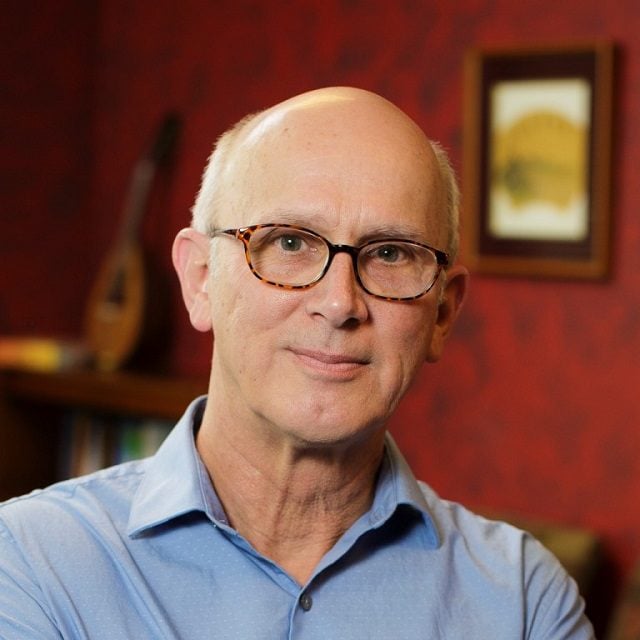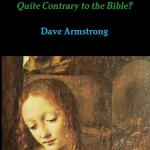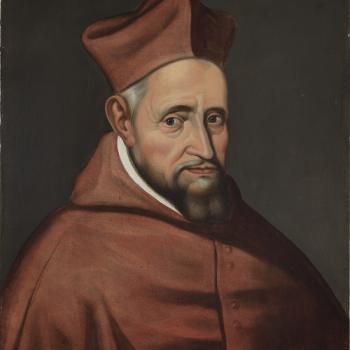
This series of mini-dialogues (most, frustratingly incomplete and “left hanging,” in my opinion), occurred in a very lively combox on my Facebook page. Karl’s words will be in blue. The sections are not necessarily chronological. He and I are good friends, with mutual respect. I consider him the father of the modern Catholic apologetics movement.
***
I don’t read Douthat regularly, but every time I’ve read him I’ve pegged him as a conservative, both politically and religiously–not as a traditionalist in either sense.
I see no evidence that he is moving toward what you [Michael Liccione] and Dave call the radical reactionary position. As for his becoming sedevacantist, Douthat is more likely to become a Scientologist first.
Questioning essential aspects of Vatican II doesn’t give you concern, as a longtime critic of reactionaries yourself?
Like you, Dave, I haven’t seen Douthat’s book yet. Like you, I’ve seen only Winters’ review in the (heterodox) National Catholic Reporter, where quotations often are cherry-picked. I’m leery of someone–whether you, Michael Liccione, or anyone else–trying to draw conclusions about Douthat’s personal status or trajectory.
That said, I can’t think of an ecumenical council that hasn’t been “questioned” in some way. The “questioning” of Vatican II has existed since about 1963, and it’s come from all parts of the spectrum.
For example, it’s become a truism, agreed upon by just about all commentators, that the council documents manifest much misplaced optimism about how things were going to be going in the world in the near future.
The documents were written on the cusp of the sexual revolution and about a decade before the general abandonment of Christianity in the West had become obvious. Most of the council fathers expected a springtime for the Church, but that spring never came–not because of the council but because of forces already long at work that those fathers didn’t have a sufficient measure of. (Some of them did, but most didn’t.)
Although two of the sixteen documents, in their titles, are denominated as doctrinal, most of the documents are considered–again, by nearly all parties–as chiefly pastoral and thus largely of prudential judgment. (Trent had pastoral provisions too, but a much smaller proportion. Other ecumenical councils also had pastoral provisions.) Pastoral provisions don’t fall under the charism of infallibility and thus are open to revision, reinterpretation, or even dispute.
I can remember discussions–in orthodox books and magazines–as far back as the 1980s where orthodox Catholics, including clerics and professors of note and impeccable reputation, pointed out ambiguities or other weaknesses in some of those sixteen documents. Again, historically this is nothing new.
The Holy Spirit guarantees that an ecumenical council won’t teach, definitively, as true something that in fact is false. He doesn’t guarantee that the council fathers will write clearly or will cover all the topics that should be addressed in their time.
I think you make some good points. Let’s cut to the quick: Do you think Pope Benedict or Pope St. John Paul would speak of failures of certain essential aspects of Vatican II, as Douthat does?
It’s possible that I am reading too much into some of his criticisms of Vatican II, which is why I will keep a close eye on further developments, but it’s also true that he has a different view than the last two popes.
I don’t know what Douthat has written about Vatican II because I haven’t seen his book (nor have you). I’m not going to draw conclusions from a review written in a heterodox newspaper by a very liberal writer who quotes only a few sentences from the book.
Given that newspaper’s reputation (I used to subscribe to it), I can’t have any confidence that the review accurately or fairly expressed what Douthat meant, so I’ll wait to read his book, which I hope to do over the next couple of weeks.
I drew my key reference from the review at One Peter Five, which incorporated several direct quotations from Douthat’s book. I also drew from Douthat’s own words in his Jan. 2016 First Things piece. I didn’t draw from Winters at all in this piece or argumentation. Neither his name nor his review appear in the above post.
*****
You seem to be operating on the notion that it is impossible to criticize a pope or council legitimately: any criticism is illegitimate a priori, which obviates the need to read, actually read, a book that proffers criticism.
You don’t seem to entertain the idea that a particular writer might have both legitimate criticisms and illegitimate criticisms.
I have argued the contrary for over twenty years, as laid out in my post, On Rebuking Popes & Catholic Obedience to Popes (which combined many past articles of mine on the topic).
This very day, I put up another post about honoring popes. In that paper, I wrote:
Now, to be clear: I’m not saying that no one can ever say or do anything about a wicked ruler. The Bible also contains Revelation 13 as well as Romans 13, as I noted recently to a severe critic on another page. I have taken the same view of popes: one can criticize under rare circumstances, with the right attitude and spirit (and the right people doing it). I’ve literally expressed that view for 20 years online (while the reactionaries denied the entire time that I did).
What one cannot do, and pretend to be honoring the pope is lambast, bash, condemn, slander, speak evil against, gossip about, spread mere rumors about a pope day in and day out. That is not “honoring” a pope or ruler, as we are commanded to do, in any way, shape, form, or matter.
We simply don’t find models of pope-bashing behavior in the Bible, even as regards one of the most wicked tyrants in history, Nero, or wicked kings of Israel, such as Saul and Solomon.
In fact, if we define “criticizing” popes very broadly, I did so myself. I would say it is respectfully offering advice, but I did do it, at National Catholic Register (Sep. 2017), in my article, “I Hope the Pope Will Provide Some Much-Needed Clarity.”
Obviously, then, what you thought my position was, was incorrect. I’m saying that the criticisms that Lawler made (the book I read) are not substantiated at all. It’s not the simple fact that he is making criticisms (though I think they should be very rare and not public). The problem is that his criticisms hold no water. That’s the biggest scandal. They simply aren’t true, and he hasn’t demonstrated that they are.
*****
I want to note that I’m distressed at seeing how these exchanges are going. I fear there will be irreparable ruptures.
I am, too. We disagree on this issue, but I continue to respect you. I don’t see that it should harm our friendship. I have hundreds of Facebook friends right now who are being critical of Pope Francis. I have hundreds of friends who detest President Trump. I have liberal friends, atheist friends, many Protestant friends. I’ve always been able to be friends with those who disagree. No problem.
Our responsibility (both of us) is to accurately represent other opinions and to not caricature or demonize them. The more emotional folks get, the more this is the temptation. We’ve all fallen into it, including myself.
*****
I don’t think the term “pope-bashing” is inappropriate, inaccurate, or should stop being used. There is undeniably pope-bashing going on. It’s not just this academically sophisticated, calm, cool, collected necessary criticism.
The Merriam-Webster Thesaurus defines “bash” in this sense as “to criticize harshly and usually publicly.” Yep. That’s what’s going on. You may think it is just and necessary criticism but it is unarguably both harsh and public. And that’s what the word means.
It gives a synonyms: “abuse, assail, attack, belabor, blast, castigate, excoriate, jump (on), lambaste (or lambast), potshot, savage, scathe, slam, vituperate.”
Thesaurus.com gives a host of synonyms for “bash” too: many of which describe exactly what is going on these days.
I still would like to know whether it’s possible, in your estimation, for there to be a book that’s critical of a pope, whether on a few or on many points, and yet isn’t a “pope-bashing” book. If Author A has exactly one criticism of a pope but Author B has 100 criticisms of him, is Author B a basher but Author A not? How is a line drawn between legitimate criticism and illegitimate criticism, assuming the latter exists? (Some Catholics apparently think no criticism can be legitimate, period.)
It’s a spirit and lack of charity and as such, can’t be quantified in the way you seek. I think what Phil Lawler wrote in his Introduction to Lost Shepherd is bashing:
. . . leading the Church away from the ancient sources of the Faith. . . . a source of division. . . . radical nature of the program that he is relentlessly advancing. . . . encouraged beliefs and practices that are incompatible with the prior teachings of the Church. If that complaint is justified, he has violated the sacred trust that is given to Peter’s successors. . . . a Roman pontiff who disregarded so easily what the Church has always taught and believed and practiced on such bedrock issues as the nature of marriage and of the Eucharist . . . a danger to the Faith . . .
Particularly, it’s “bashing” because he made the extraordinary claims but never came within a thousand miles of proving them beyond all doubt. He never proved that the pope was indeed “lost” per the title of the book. In other words, I could only conclude that these dramatic statements were falsehoods. (or at the very least, inadequately demonstrated; therefore, not worthy to be asserted). And spreading unsubstantiated rumors about another is clearly bashing them.
I kept waiting for this amazing compelling demonstration to appear in the book: to prove definitively that Pope Francis is an anti-traditionalist subversive, but it never came, which is why I compared reading it to peeling an onion and finding no core in the final analysis (or peel).
Non-bashing criticism would be like what St. Catherine of Siena wrote to Pope Gregory XI:
I have prayed, and shall pray, sweet and good Jesus that He free you from all servile fear, and that holy fear alone remain. May ardor of charity be in you, in such wise as shall prevent you from hearing the voice of incarnate demons, and heeding the counsel of perverse counselors, settled in self-love, who, as I understand, want to alarm you, so as to prevent your return, saying, “You will die.” Up, father, like a man! For I tell you that you have no need to fear.
Note that she was a saint, a mystic, and a Doctor of the Church, too. This is one of my points of protest against what is happening. It was also a private letter (another big point of mine).
*****
If you [Pete Vere] (and Dave and others) think that the likely small sales of Douthat’s book (at least when compared to Dawkins’ book) means that Douthat is inconsequential, . . . I think that they will have substantial influence and are worth talking about, provided the talking is done without hysterics, exaggeration, and name-calling–and preferably by people who actually have read the books.
Yeah, me too. I’ve disagreed repeatedly with Pete yet you seem (who knows why?) to think I haven’t. If I didn’t think these books were important and influential (not to mention quite harmful), I wouldn’t be devoting scores of hours to writing about them.
I find the exchanges fascinating, though I don’t mean by that that I’ve found them particularly satisfying intellectually. I think there’s been more dross than fine metal.
I couldn’t agree more. Now if you would actually take it upon yourself to interact with any of my six critiques of Phil Lawler’s book, then we actually might accomplish something constructive in these exchanges because (novelty!) we’d actually be talking directly about the contents of the book, rather than about people.
You’re welcome to critique my latest piece about Henry Sire [The Dictator Pope author], too.
*****
[Julian Barkin: “So then Dave based on your four point criteria of [radical Catholic reactionaries], Douthat would be one now or close to it? Pope bashing or supporting such, check. Bashing Vat II? Check.”]
He (like Lawler) thinks like them in two of four key aspects. The other two are anti-ordinary form Mass and anti-ecumenism. How close he is, I don’t know. That will be determined by watching his progression into the future. I think if he is moving that way, it’s gradual.
Is being “anti-ordinary form Mass” the same as being “pro-extraordinary form Mass”? If someone prefers the old form over the new, is he thus part way to becoming a “radical reactionary”? Is it possible to prefer the Extraordinary Form and not be tainted with radical-reactionaryism at all?
Once again, you are quite unfamiliar with my thought, as consistently expressed through the years. There’s nothing wrong with that (no one can know all the thought of another), but I’m just saying that I have never ever expressed what you fear here. Quite the contrary, in fact.
There is nothing whatsoever wrong with preferring the EF [Extraordinary Form / “Old” / Tridentine Mass]. I have favored availability of the EF from the minute I converted, in 1990. I attended one such Mass shortly after my conversion (we had to cross the river to Windsor, Ontario, in those days, as there were none available in Detroit). I attended a parish for 25 years which offered it, but more regularly, the OF [Ordinary Form / Pauline / “New” Mass] in Latin, with high tradition and reverence (altar rails, facing the altar, etc.).
I am still a member of a parish (it’s a two-church cluster) which sometimes offers the EF and a very traditional, reverential OF (and I continue to prefer OF, as I always have). So, it’s not preference for the EF which is any sort of problem. I am all for that: 110%. Probably 75% of all the Masses I have attended since 1990 were in Latin (though OF).
It’s the bashing of the OF as vastly inferior, sub-par, heterodox, or, in extreme cases, invalid, which is the problem. That creates divisions and animosities. That runs contrary to Pope Benedict’s Summorum Pontificum, which I have strongly defended over against reactionaries like Dr. Peter Kwasniewski, who are now rejecting the reform of the reform and, by logical necessity, also the interior logic and conclusions of SP.
So you see, Karl, once again, our differences are not nearly as great as you feared. If you ask me what I believe, I’ll tell you. I’m not some wild-eyed radical. I’ve been in the same general place I’ve been my entire 28 years as a Catholic: orthodox, Newmanian, lover of JPII and Vatican II and the current Mind of the Church, which (rightly understood) presupposes all existing tradition.
We agree here, and we agree that it is possible to criticize a pope (just very widely in degree and nature, on the latter). I’m not an ultramontanist. That’s always the charge whenever someone complains about papal criticism: that we never accept any, ever, under any circumstances.
The various issues involved have to be discussed on their merits. Start with my five reviews of Lawler, or my Amazon review, which condenses the “meat” of all five. If you’ll stop looking at me and thinking I am becoming some unhinged fanatic, and simply address my arguments, I think we could make much progress, and agree on lots of things, just as we agree on these two things you brought up today (acceptance of the EF as perfectly fine and there being such a thing as permissible pope-criticism).
But you never need fear a terrible rupture between us. I respect you far too much as the father of modern apologetics, and Catholic Answers, for that ever to happen, or even be thinkable / conceivable. There are some “big names” out there who have given up on me, and unfriended me, but very few, when all is said and done. And that’s because I can get along with anyone, if they are willing, too. Because of that, I’ve had four major reconciliations in the last few months. We still disagree on things, but we are able to be friends. You’ve been far more critical of me than I have been of you through all this.
***
Photo credit: Photograph of Karl Keating, in the article, “Exclusive Interview: Karl Keating – Catholic Answers” (Aurelio Porfiri, O Clarim, 8-12-16).
***

















